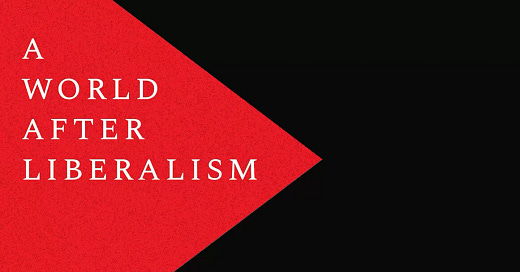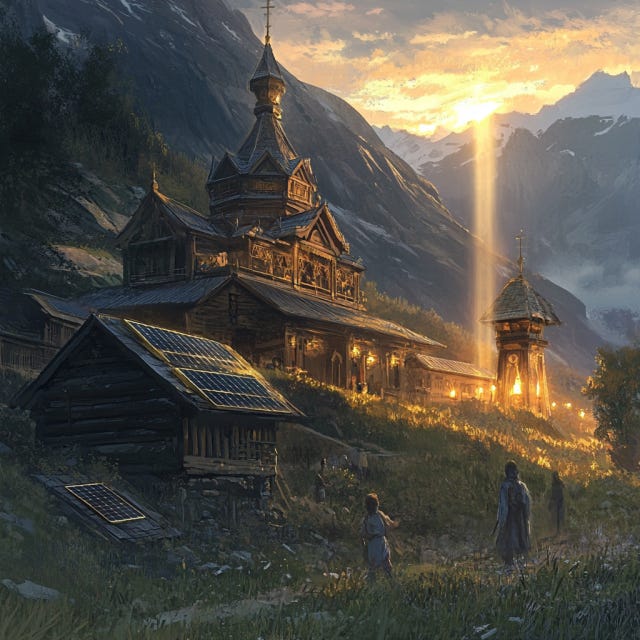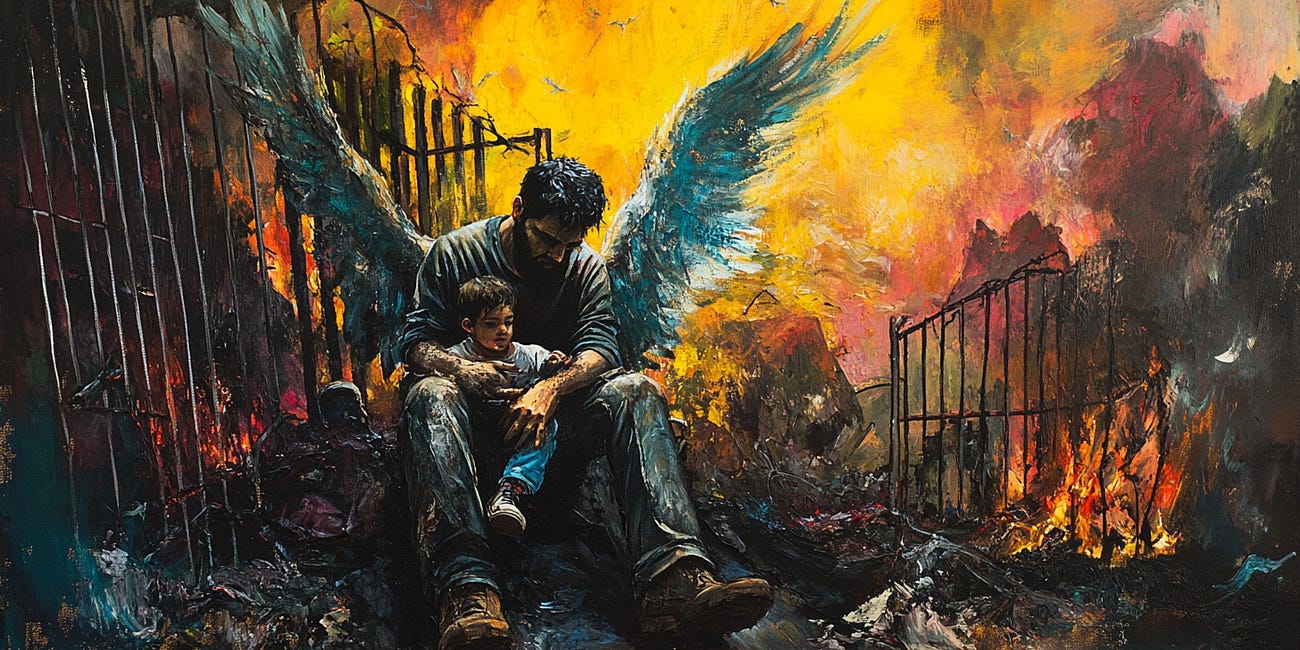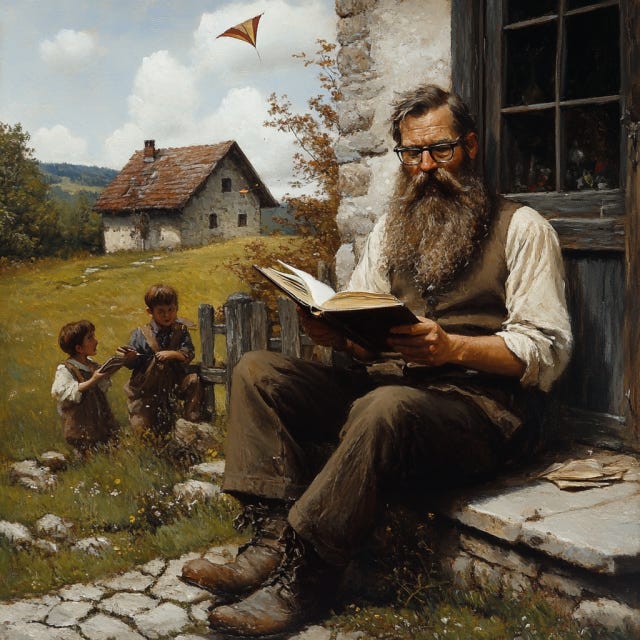A World After Liberalism explores one of the most dangerous ideas in the Woke totalitarian ethos. It is taken for granted that the post-war world-order is going to last forever and that liberalism is “the way” and that we live on the arc of history moving ever towards more extreme visions of liberalism. The book poses a question that terrifies the modern Woke progressive bully: what happens when liberalism ends? What will come after liberalism?
This book is basically a recommended reading list and cliff-notes for several Dissident-Right authors: Oswald Spengler, Julius Evola, Francis Parker Yockey, Alain de Benoist, and Samuel Francis. Each of these authors contributed over the last century with their respective views regarding The Decline Of The West and the ways in which Western Faustian civilization might be restored or its decline managed.
Unfortunately, the author views these individuals through a decidedly reactionary lens, and provides little clear image of what an illiberal world would actually look like. A work of substantial gravitas that I am slowly attempting in my own work regarding Holistic Civilization and the post-liberal world order. (Stay tuned for that).
A Future Beyond Materialism: Holistic Civilization
While this is a long article, it contains a lot of background and is well worth the read.
In a general sense, the author of “A World After Liberalism” focuses on the construction of the modern Dissident Right through the lens of a civilization having reached its philosophical apex in the late 1800s and is now slowly coasting towards its conclusion. Whether there will be an Imperial century or an era of balkanization is yet to be seen.
In either case, no civilization lasts forever (counter to the conception of its residents at any time). The rise of the global south and corresponding weakening of borders across the West maps well onto Spangler’s analysis from a century ago.
The book “A world after liberalism” is more of a cliff-notes version of the most influential writers of the last century than it is the development of new ideas. The author catalogues and specifies different writers and the influence they’ve had on the development of what is today the modern “far-right” or “dissident-right” or whatever other title the [media] throw at the political organizations.
It is highly recommended reading for those unwilling to dedicate 55 hours to reading through the works of Spangler or a hundred hours pawing through the works of Evola. A short and to-the-point conception of what is today a vast series of philosophical works, some of which take a hundred pages to begin making their first point.
As such, the book “the World After Liberalism” could be treated as an introduction or as a reading-list for those interested in the philosophy behind the modern dissident right. The text discusses deep positions on ethics and morality, tribalism, civilization, and the failures of liberalism. Most prominently, the failure of liberalism to provide a noble world-view capable of motivating future generations. The author understands more than most that the time of liberalism is ending and it is ending by its own incompetent hand.
The managerialism of liberalism is self-destructive as it becomes bloated and creates an unhappy unmoored population of drones that lose the capacity to create culture. A cultureless population has nothing to pass on to the next generation, and a hedonistic people have no desire to create a next generation. Instead of building great monuments, they smoke weed and drink in their basements. The victory of managerial liberalism is lethal to the very society that birthed it… and violently opposed to the cultures of rural folk who dare retain rich cultures of their own. [See post-faustian ethnos below].
This type of societal decadence is not new. It being global is new.
Post-Faustian Ethnos: Identity and Race
The following article is may piss off some members of the far-right, particularly those who associate racial identity as primary descriptor. The Faustian civilization of Europe developed from the peoples of Europe. The argument is that for Faustian civilization to survive, it remains inherently bound to the peoples that birthed it.
The Authors “Solution” to the Dissident Right
The author is clearly terrified of the growth of anti-liberal traditions and institutions. As a managerial type, the author seeks to use other cultural powers to attack the dissident right as liberalism has no solution to its own nihilism.
The author attempts to develop a Christian opposition to the modern dissident right. The argument is (to shorten the authors statements) that brotherhood in Christ is more powerful than tribal blood bonds. The author also notes the decidedly anti-Christian nature of many of the historic thinkers of the Dissident Right who have stated that Christianity as a religion is what inherently led to the decline of the West. The author seems to hope to use that fact as a wedge.
A counter is to paraphrase Evola in that in the rise of the West, the Faustian Man created Faustian Christianity… and in the deterioration of the West, the cultural unity provided by Christianity deteriorated with it.
The book states that the modern dissident Right is decidedly anti-Christian in nature. While I disagree, it is clear that many of the dissident right thinkers find it to be anti-Christian as a byproduct of standing against philosophies of blind unity and universal egalitarianism. Modern Christianity is not the motivating force it once was, and its philosophical esoterics have decayed to a simple message of “love every one, even those guys who want you dead.”
Simultaneously hard-liner churches like the Eastern Orthodox are quickly accruing membership from future generations.
Near the end of the text, the author makes calls to the Christian Right to act against the interests of the young Dissident Right for the purposes of maintaining liberalism. That same liberalism that has been attempting to destroy spiritual hierarchy throughout the West for several generations now and which has seen the most rapid decline in faith in human history.
Many churches have been too obsessed with remaining palatable to the culture to remain spiritually consistent. The corrosion of universal hedonism coupled with a blinded universal love has resulted in a church that’s little more than a gathering-ground for boomers to complain about the next generation. Some churches have retained their moral centers and are therefore rapidly growing as people seek a spiritual out from the cruel bullies acting on behalf of Woke religiosity.
The Christian Right has been weak in defending itself from the woke religion, but not all of the Christian Right has been conquered. Those that have been conquered are definitionally culturally weak, thus cannot serve as the bulwark that progressives believe them to be. Strong churches are unwilling to be used as pawns by violent progressive extremists, and are much more likely to maintain a moral position similar to that of the dissident Right.
Based on the text, one could imagine the synthesis of the modern Dissident Right and the Christian Right by evaluating real cultural diversity. While managerial liberalism seeks to amalgamate all people into a single cultureless sludge of economic production, identity and lineage may be drawn just as much from a Christian identity as a pagan one.
The author claims that in a greater Christian heritage all people are as a single people and thereby deified. An appeal to the arrogance of the modern Dissident Right, I suspect. A nearly heretical view from the perspective of a true Christian who does not presume parity with God, but a place in the greater plan of Creation. The authors appeals at the conclusion of the text fall far short of an honest appeal to morality.
The Counter: a Post-Liberal Christianity
Ultimately managerial liberalism will fail.
It provides no meaning outside the decisions of the self, no duty outside of hedonism, and no fulfillment as one lives without attachment. Fulfillment and meaning are found in the duties inherited from ones fathers and provided to ones children. As a consequence of its inability to square with human nature, Liberalism is dying as an ideology. Literally in the case of demographic population decline.
While the authors intent appears to included appropriation of the Christian Right as a bludgeon against the dissident right, it does pose an interesting question: what does a post-liberal Christianity look like?
A post-liberal Christianity will express that all peoples are the born of the same Divine root, but do not make up interchangeable entities. Peoples of the same faith worship God in different ways and through different faces. The faces of god can be recognized as human construction of cultural and genetic lineage. The way in which Truth is found and the way in which the divine is observed make up unique, culturally and philosophically distinct peoples.
Just as brothers of the same family lineage can be incompatibly different, so too can different lineages be brothers in Christ yet incompatibly culturally distinct. To preempt any attempt by the decrepit historical Christian Right to consume the modern dissident right, we must synthesize arguments that before God peoples can be of divine spirit while remaining distinct. A Christian Somalian is not an Irish Catholic and equating the two as spiritually identical is fundamentally wrong. Rather humanity is a vast tree stretching to the heavens, not all branches will crest the clouds, and knotting them together into an indistinct bundle will ensure none of them do.
Conclusion
The text contains many themes, and I highly recommend it. The philosophical background of the modern Dissident Right is clearly defined throughout the text and only the ending represents a philosophical corruption. Many of the major philosophical figures and works are discussed accurately and honestly to provide a clear perspective on their ideas.
The book “A World After Liberalism” is a great cliff-notes introduction to the principles of the modern dissident-right even if the author doesn’t agree with those principles. It also acts as a very good introductory reading list while providing a rough outline of philosophical content. It’s motivating for the development of new ideas and grounding for those who wish to eventually actually read through Spangler or Evola.
The author takes the position of acting at odds with the modern dissident right, but does an excellent job outlining the principles therein and doing so honestly. The authors last-ditch attempt to sow division towards the end of the text appears to be an expression of intellectual desperation. The author understands that the ideas of the dissident Right are more unifying and more motivating than the ideas purported by the modern Woke Left.
I’d highly recommend the book, or the audible version of it for any one interested in the material but who doesn’t have the time or inclination to dig through reams of philosophical diatribes.








Christendom was never meant to be liberal. Modern milquetoast professing Christians often sweat fealty to liberalism and modernity above virtue, Truth, justice, duty, and God’s design for mankind. They need to check their priors. The Kingdom of God is much preferable to the Managerial Bureaucracy of Globohomo Man. All Christians recognize that the World is the dominion of darkness, we have been saved from this and brought into the Kingdom of Light. And they also know to judge the fruits of anything, including a society. Yet our Government of Man is clearly leading to evil fruits proliferating and good fruits being choked out, clearly this American government/Western civ is under sway of the Dominion of Darkness. And yet somehow touching the foundations of this rotten house is considered reprehensible? Democracy is not in the Bible, the 19th Amendment in not in the Bible, the United Nations is not in the Bible, secular public schools are not in the Bible, global corporations are not in the Bible, DEI is not in the Bible. These are false idols which no Christian should swear fealty to.
How can you tell that “God is Love” “Love Your Neighbor” “We are all one” etc. Christianity is false? These basic statements are the basic statement myths of modern American globohomo compatible Christianity.
Simple. The story of the Tower of Babel. What did God do? Gave us different languages. For whatever reasons he decided we would not be homogenous. Even in Revelations, nations of people are mentioned.
I personally have changed the minds of some standard Christian nondenominationals simply by saying this.
Here is the thing, the Dissident Right is as a movement still figuring itself out. But the author has priors they assume work because of how they think people on the Right think. They assume the Right to be “Christian” (something they probably don’t understand very well anyway). So they wish to push the Dissident Right into that box.
This is all really about trying to find a holding mechanism for the Dissident Right akin to how Conservatives are held.